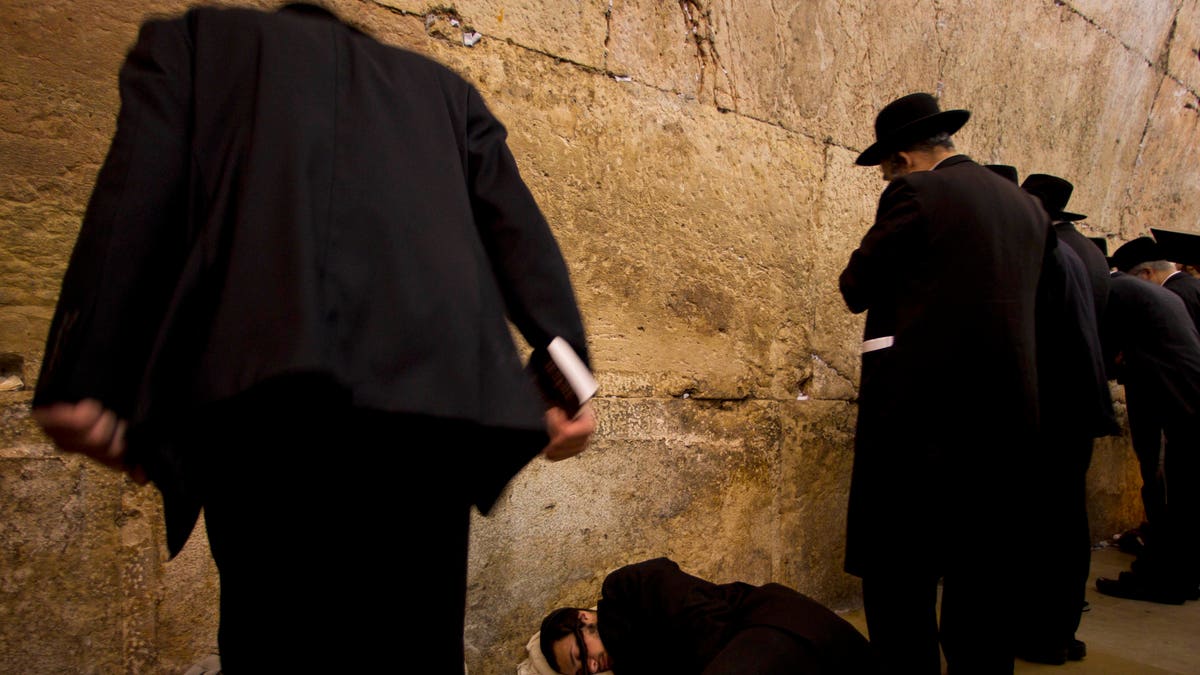
An Ultra-orthodox Jewish man sleeps as others pray during the mourning ritual of Tisha B'Av at the Western Wall, the holiest site where Jews can pray, in Jerusalem's Old City, Tuesday, Aug. 9, 2011. The Jewish holy day of Tisha B'Av, when Jews mourn the destruction of the biblical temples, is marked Tuesday. (AP Photo/Bernat Armangue) (ASSOCIATED PRESS)
In a move seen by activists as a win for women's rights, the Israeli High Court ruled Wednesday in interim injunction that the Western Wall Heritage Foundation and other state agencies must explain why women should not be allowed to pray in accordance with their custom at the traditional plaza.
A LOOK AT THE STAKES IF AMERICAN EMBASSY MOVED TO JERUSALEM
The could also ruled women could not be subjected any longer to intense body searches when entering the Western Wall in Jerusalem, a practice that happened frequently in the past.
The court gave the Wall’s orthodox Rabbi Shmuel Rabinowitz and other officials 30 days to submit their reasoning for why women cannot pray as they choose, “in accordance with their custom.”
ISRAELI OFFICIAL: COOPERATION STRONG WITH EGYPT
The phrase “in accordance with their custom” refers to the practice of reading from the Torah on days when Jewish law requires a Torah reading, such as New Months and other holidays when some women seek to read from the Torah at the Western Wall. Rabinowitz does not keep Torah scrolls at the women's prayer area and does not let people bring their own, Haaretz reported.
The Women of the Wall on Wednesday hailed the “courageous” ruling that women will no longer be subjected to body searches under suspicion of bringing in items such as Torah scrolls and prayer shawls.
“In its ruling, the Court put the onus on the defendants to justify withholding Jewish women’s rights to full religious expression, rather than asking us to defend that we have them,” the Original Women of the Wall statement declared.
The resolution was reached after nearly three years of negotiations between the Women of the Wall and the Reform and Masorti (Conservative) Movements in Israel, based on the premise that if it was implemented those groups would give up the right to pray in the main section of the Western Wall. The resolution would create an expanded and upgraded prayer section for pluralist prayer at the Robinson’s Arch area, which would be explicitly recognized by the state as designated for progressive Jewish prayer.
In saying that an alternative to allowing women to read from Torah at the central Western Wall prayer site would be creating a site with “full access” to the wall itself, the court was strongly hinting that the respondents should implement the Western Wall resolution approved by the cabinet in January. Under the January agreement, the egalitarian section of the wall near Robinson’s Arch would be expanded and placed under the authority of a pluralist committee. The plan called for solidifying Haredi Orthodox control over the site’s traditional Orthodox section.







































